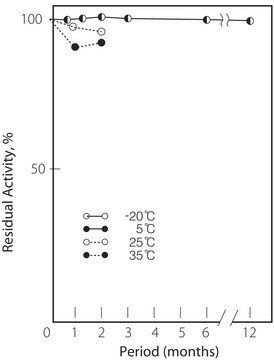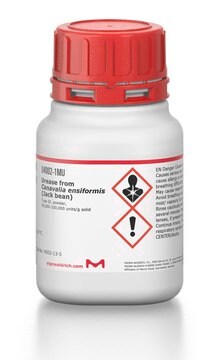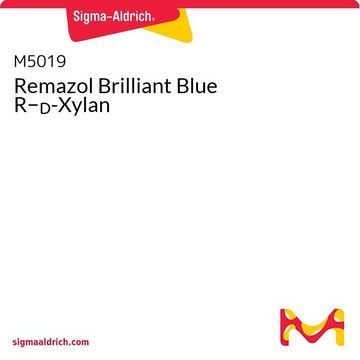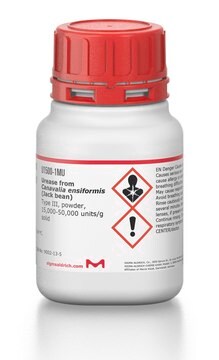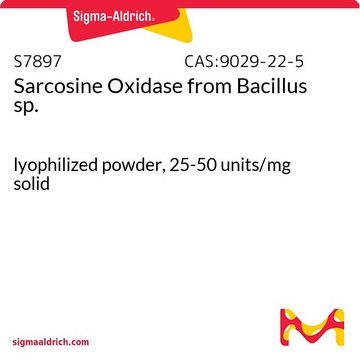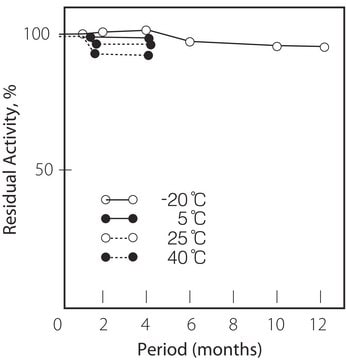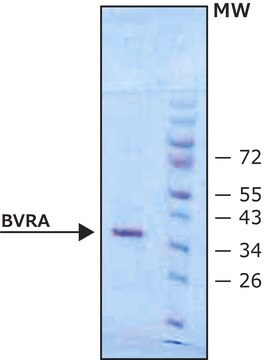C9409
Creatinine Deiminase microbial
lyophilized powder, ≥25 units/mg protein
Synonyme(s) :
Creatinine Deaminase
Se connecterpour consulter vos tarifs contractuels et ceux de votre entreprise/organisme
About This Item
Numéro CAS:
Numéro CE :
Numéro MDL:
Code UNSPSC :
12352204
Nomenclature NACRES :
NA.54
Produits recommandés
Forme
lyophilized powder
Activité spécifique
≥25 units/mg protein
Poids mol.
~260 kDa
Composition
Protein, ≥15% biuret
Température de stockage
−20°C
Catégories apparentées
Application
Creatinine Deiminase microbial has been used:
- to immobilize aminosilylated glass beads based biosensor for ammonia/ammonium and creatinine detection in urine
- in creating creatinine-sensing membrane for biophysical studies
- to investigate the bioelectronic tongue for the simultaneous determination of urea, creatinine and alkaline ions in clinical samples
Creatinine deiminase has been used in a study to assess the application of a creatinine-sensitive biosensor for hemodialysis control. Creatinine deiminase has also been used in a study to investigate the bioelectronic tongue for the simultaneous determination of urea, creatinine and alkaline ions in clinical samples.
Actions biochimiques/physiologiques
Creatinine deiminase catalyzes the hydrolysis of creatinine to methylhydantoine and ammonia.
Propriétés physiques
Isoelectric point : 4.4
Michaelis constant : 3.5 x 10‾3M (Creatinine)
Structure : 6 subunits per mol of enzyme
Inhibitors : Ag+,Hg++, o-phenanthroline,monoiodoacetate
Optimum pH : 8.5 – 9.5
Optimum temperature : 65 – 75°C
pH Stability : pH 7.0 – 11.0 (30°C, 20hr)
Thermal stability : Below 65°C (pH 7.5, 1hr)
Michaelis constant : 3.5 x 10‾3M (Creatinine)
Structure : 6 subunits per mol of enzyme
Inhibitors : Ag+,Hg++, o-phenanthroline,monoiodoacetate
Optimum pH : 8.5 – 9.5
Optimum temperature : 65 – 75°C
pH Stability : pH 7.0 – 11.0 (30°C, 20hr)
Thermal stability : Below 65°C (pH 7.5, 1hr)
Définition de l'unité
One unit will hydrolyze 1.0 μmole of creatinine to N-methylhydantoin and NH3 per min at pH 7.5 at 37 °C in a coupled system with L-glutamic dehydrogenase.
Forme physique
Lyophilized powder containing mannitol as stabilizer
Code de la classe de stockage
11 - Combustible Solids
Classe de danger pour l'eau (WGK)
WGK 3
Point d'éclair (°F)
Not applicable
Point d'éclair (°C)
Not applicable
Équipement de protection individuelle
Eyeshields, Gloves, type N95 (US)
Faites votre choix parmi les versions les plus récentes :
Déjà en possession de ce produit ?
Retrouvez la documentation relative aux produits que vous avez récemment achetés dans la Bibliothèque de documents.
Anne K Bendt et al.
Archives of microbiology, 181(6), 443-450 (2004-05-19)
In order to utilize different nitrogen sources and to survive situations of nitrogen limitation, microorganisms have developed several mechanisms to adapt their metabolism to changes in the nitrogen supply. In this communication, the use of creatinine as an alternative nitrogen
Hybrid biosensors for clinical analysis and fermentation control.
I Karube
Methods in enzymology, 137, 131-138 (1988-01-01)
T W Esders et al.
The Journal of biological chemistry, 260(7), 3915-3922 (1985-04-10)
Creatinine iminohydrolase (EC 3.5.4.21), which catalyzes hydrolysis of creatinine to N-methylhydantoin and ammonia, was purified from Flavobacterium filamentosum. The average molecular weight of the purified enzyme was 272,480, and the subunit molecular weight was 44,300. Extensive specificity studies indicated that
[Immobilized enzyme reactors--their use in chemiluminescence detection].
M Tabata et al.
Tanpakushitsu kakusan koso. Protein, nucleic acid, enzyme, 31(3), 220-229 (1986-03-01)
Hsiao-Chung Tsai et al.
Analytical biochemistry, 334(1), 183-192 (2004-10-07)
An optical array biosensor encapsulated with hydrolase and oxidoreductase using sol-gel immobilization technique has been fabricated for simultaneous analysis and screening of multiple samples to determine the presence of multianalytes which are clinically important in relation to renal failure. Urease
Notre équipe de scientifiques dispose d'une expérience dans tous les secteurs de la recherche, notamment en sciences de la vie, science des matériaux, synthèse chimique, chromatographie, analyse et dans de nombreux autres domaines..
Contacter notre Service technique